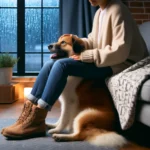As a young dog lover, have you ever wondered why your furry friend sometimes hides away when they’re not feeling their best? It’s a common behavior that many dogs exhibit when they’re sick or in pain. In this article, we’ll explore the reasons behind why dogs hide when they’re not feeling well, what signs to look out for, and how you can help your canine companion feel better.
Understanding Canine Behavior
Dogs are known for their loyalty, playfulness, and affection, but they also have instincts that drive their behavior, especially when they’re not feeling their best. One such instinct is the desire to retreat and find a quiet, safe space when they’re sick or in pain. Here’s why:
1. Instinctual Behavior
- Dogs have inherited instincts from their ancestors, who would hide when they were injured or ill in the wild to protect themselves from predators.
- Hiding allows dogs to conserve their energy and avoid drawing attention to themselves when they’re vulnerable.
2. Pain and Discomfort
- When dogs are in pain or discomfort, they may seek solitude to avoid further stress or stimulation.
- Hiding provides them with a sense of security and comfort, similar to how we might retreat to our beds when we’re not feeling well.
3. Stress and Anxiety
- Dogs can experience stress and anxiety when they’re unwell, which may lead them to seek out quiet, familiar spaces where they feel safe.
- Loud noises, unfamiliar surroundings, or even well-meaning attempts to comfort them can exacerbate their anxiety and cause them to hide.
Signs That Your Dog May Be Hiding Because They’re Not Feeling Well
It’s essential to recognize the signs that your dog may be hiding because they’re not feeling well so you can provide them with the care and support they need. Here are some common indicators to watch out for:
- Withdrawal: Your dog may become more withdrawn and less interested in interacting with you or other pets.
- Hiding: They may seek out secluded areas in your home, such as under the bed or in a closet, to rest and recuperate.
- Decreased Appetite: A loss of appetite is often a sign that something isn’t right with your dog’s health.
- Lethargy: If your dog is hiding and also showing signs of lethargy, such as reluctance to move or play, it could indicate that they’re not feeling well.
- Changes in Behavior: Pay attention to any changes in your dog’s behavior, such as increased irritability or aggression, which could be a sign of pain or discomfort.
If you notice any of these signs, it’s essential to consult with your veterinarian to rule out any underlying health issues and ensure your dog receives the appropriate care and treatment.
How to Help Your Dog Feel Better
Once you’ve identified that your dog is hiding because they’re not feeling well, there are several steps you can take to help them feel better:
1. Provide a Comfortable Environment
- Create a quiet, comfortable space where your dog can rest undisturbed, such as a cozy bed in a quiet corner of your home.
- Ensure that the area is free from loud noises and other distractions that could cause stress or anxiety.
2. Offer Support and Reassurance
- Spend time with your dog, offering gentle reassurance and comfort without overwhelming them.
- Avoid forcing them to come out of hiding or engaging in activities that could exacerbate their discomfort.
3. Monitor Their Symptoms
- Keep a close eye on your dog’s symptoms and behavior, noting any changes or developments.
- If their condition worsens or if you notice any new symptoms, contact your veterinarian for guidance.
4. Follow Your Veterinarian’s Advice
- Follow any recommendations or treatment plans provided by your veterinarian to ensure the best possible outcome for your dog’s health and well-being.
- Administer any prescribed medications as directed and attend follow-up appointments as needed.
By providing your dog with a comfortable environment, offering support and reassurance, monitoring their symptoms, and following your veterinarian’s advice, you can help them feel better and recover more quickly.
Conclusion
Dogs hide when they’re not feeling well as a natural instinct to protect themselves and seek comfort. By understanding the reasons behind this behavior and knowing how to recognize the signs that your dog may be hiding because they’re unwell, you can provide them with the care and support they need to feel better. Remember to consult with your veterinarian if you have any concerns about your dog’s health or behavior, and always follow their guidance to ensure the best possible outcome.
Frequently Asked Questions (FAQs)
Q: Should I try to coax my dog out of hiding when they’re not feeling well? A: It’s best to respect your dog’s desire for solitude and allow them to come out on their own terms. Forcing them to leave their hiding spot could cause further stress and discomfort.
Q: How long should I wait before contacting my veterinarian if my dog is hiding and not feeling well? A: If you notice any concerning symptoms or changes in your dog’s behavior, it’s best to contact your veterinarian as soon as possible for guidance. They can help determine the underlying cause of your dog’s distress and recommend appropriate treatment.
Q: Can hiding be a sign of a serious health issue in dogs? A: Yes, hiding can sometimes indicate a more serious underlying health issue, such as injury, illness, or disease. It’s essential to monitor your dog’s symptoms closely and consult with your veterinarian if you have any concerns.
Q: Are there any ways to prevent my dog from hiding when they’re not feeling well? A: While you can’t always prevent your dog from hiding when they’re unwell, providing a comfortable and supportive environment can help alleviate their stress and discomfort. Offering reassurance and monitoring their symptoms closely can also help ensure they receive the care they need.



